|
|
|
Sort Order |
|
|
|
Items / Page
|
|
|
|
|
|
|
| Srl | Item |
| 1 |
ID:
146701
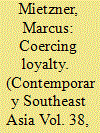

|
|
|
|
|
| Summary/Abstract |
Scholars of coalitional presidentialism have focused on the question of how presidents in multi-party systems manage to establish stable governments. Some authors have argued that in the case of Indonesia, post-authoritarian presidents have prioritized inclusivist alliance building, with all parties offered cabinet seats and other rewards in exchange for loyalty. However, as this article demonstrates, President Joko Widodo has opted for a more coercive approach: reactivating power tools not used since the days of Suharto’s autocracy, he intervened in the internal affairs of at least two opposition parties and eventually forced them to declare their support for his administration. This method, while designed to obstruct the anti-democratic agenda of the opposition, has in itself had detrimental effects on Indonesia’s democratic quality.
|
|
|
|
|
|
|
|
|
|
|
|
|
|
|
|
| 2 |
ID:
154722
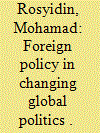

|
|
|
|
|
| Summary/Abstract |
Since President Jokowi came to power in October 2014, Indonesia’s foreign policy has undergone fundamental change, most obviously in the state’s emphasis on domestic priorities rather than global engagement. Although Jokowi’s foreign policy has pursued an ‘active’ principle by participating in many international forums, it seems to have overlooked the changing contexts of the geopolitical turn. Asia has been rising and is becoming the geopolitical center of gravity in the 21st century. Yet, instead of adapting to this shift, Indonesia’s foreign policy continues to neglect the ‘Asian Century’ turn that has been taking place for years. Indonesia should have increased its international profile to enhance its status as a ‘Third Asian Giant’ beside China and India, but Jokowi’s administration has not taken such an opportunity. This article argues that Indonesia is not interested in gaining international status because of the domestically focused nature of its foreign policy. Indonesia is seen as needing to consolidate its own national resilience before asserting itself in a wider international arena. For Jokowi, national interest is defined as material—primarily economic—interest. In addition, Indonesia’s traditional status as a regional, middle level international power prevents the country from seeking any greater global status. This article argues, with optimism, that Indonesia should seek to change this traditional paradigm of middle power status. It suggests that the assertion of global status matters in Indonesia’s foreign policy because the better the country’s position in the international hierarchy of states, the easier it will be for the nation to achieve its own domestic interests.
|
|
|
|
|
|
|
|
|
|
|
|
|
|
|
|
| 3 |
ID:
169228
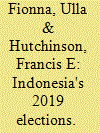

|
|
|
|
|
| Summary/Abstract |
In April 2019, Indonesia carried out simultaneous presidential and legislative elections. With an estimated 192 million voters acceding to 800,000 polling stations, this was the world's largest direct presidential election. Barring some dispersed claims of irregularities, the mammoth task of electing public representatives at the national as well as provincial and local levels was successfully carried out. Indonesia's voters had to decide on the 575 members of the national parliament, as well as some 20,000 seats in the country's many provincial and local legislatures, including 2,207 provincial level MPs from 34 provinces and 17,610 local councillors from more than 500 local authorities. Voter turn-out was an estimated 81.9 percent, the highest yet since Indonesia's transition to full democracy. Thus, at first blush, this electoral exercise can be seen as a logistical and political achievement, and an addition to Indonesia's track record of successfully-held elections. Yet, despite its technical proficiency and solid participation, the 2019 polls highlight pervasive societal and geographic fault-lines and raise questions about the strength of Indonesia's democratic institutions.
In order to analyse the importance of these elections, this article is comprised of six parts. Following this introduction, the second section briefly discusses the salient aspects of Jokowi's first administration. The subsequent part sets out the run-up to the presidential campaign, paying particular importance to changes in ‘rules of the game’ that altered the structural dynamics of the elections. The fourth section compares and contrasts the campaigns of the two opposing coalitions and the fifth analyses the electoral results. The final section concludes by discussing the denouement of the elections before looking forward.
|
|
|
|
|
|
|
|
|
|
|
|
|
|
|
|
| 4 |
ID:
151736
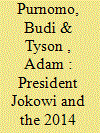

|
|
|
|
|
| Summary/Abstract |
During the 2014 presidential election in Indonesia two diametrically opposed candidates appeared to abide by an informal set of rules whereby neither challenged the other’s integrity in public. Privately, however, campaign advisors devised ways to attack their opponents, primarily by using media contacts to spread rumors and allegations. As a result, the 2014 presidential race in the world’s third largest democracy was the most negative and polarizing since the fall of Suharto’s authoritarian regime in 1998. The Obor Rakyat media scandal, a major political event in 2014 that remains understudied, represented a new manifestation of rumor politics and smear campaigning aimed at President Jokowi, widely hailed as a novel reformist politician because of his relatively clean record and lack of direct association with the Indonesian political establishment. In particular, the Obor Rakyat reports made three serious allegations against Jokowi: that he is a bad Muslim, that he is a puppet president, and that he is in the pocket of Chinese financiers known as cukong.
|
|
|
|
|
|
|
|
|
|
|
|
|
|
|
|
| 5 |
ID:
146533
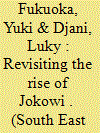

|
|
|
|
|
| Summary/Abstract |
Just a few months into his first term, the new president of Indonesia, Jokowi, began to disappoint his supporters who had expected his presidency to enhance the quality of Indonesia’s dysfunctional democracy.1 Contrary to his campaign promise of establishing a ‘clean’ and ‘professional’ government without horse-trading, Jokowi granted strategic government positions to those with links to oligarchic interests, indicating that key decisions were largely dictated by his party patrons. Much of the literature, which has tended to portray the rise of Jokowi as a challenge to oligarchic interests, is not well placed to account for this ‘U-turn’. Against this backdrop, this article explores another dimension of Jokowi’s ascendance, arguing that it should also be understood in the broader context of oligarchic adaptation of ‘post-clientelist’ initiatives – measures to attract enlightened voters to compensate for increasingly ineffective clientelistic mobilisation. This is not to argue that Jokowi was simply made a ‘puppet’ of his patrons, but to suggest that more attention needs to be directed to the broader structural constraints placed on Jokowi in order to have a more nuanced understanding of the political context in which he must operate.
|
|
|
|
|
|
|
|
|
|
|
|
|
|
|
|
|
|
|
|
|